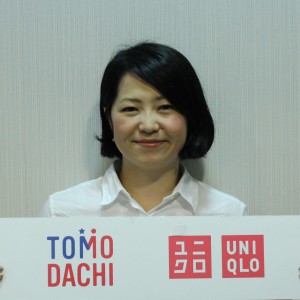TOMODACHI Generation: Hiroko Hiraki

Hiroko Hiraki worked at Amina Collection, which sells and promotes international folklore items in Japan, as a Supervisor of the Merchandise Headquarters Import Division. She managed the merchandise lifecycle of the company’s products and traveled throughout Asia and South America for her job. She will be pursuing a master’s degree in Global Fashion Management at the Fashion Institute of Technology in New York from the Fall 2015 semester. Through this TOMODACHI UNIQLO Fellowship, she hopes to gain a better understanding of the keys to success in the international fashion market and eventually help Japanese fashion brands integrate into the global market.
For more information on the TOMODACHI-UNIQLO Fellowship, click here
About Hiroko Hiraki
Q: Why did you decide to apply to this program?
A: One reason for applying was that although I have been working in the fashion industry for more than 10 years, I wanted to learn more about foreign markets outside of Japan. In the larger sense, I applied to this program because I thought that I needed to broaden my perspective. At FIT, students have the opportunities to learn about a wide range of topics, so as soon as I saw this program, I knew that it was the one for me.
Q: What aspect of Japan do you feel you can contribute to and how will your education in FIT help you achieve this?
A: At FIT, instead of just focusing on one country, you learn about fashion on a global scale and from many aspects. In Japan, the manufacturing and finished good industry is mainly focused on China, other Asian countries, and sometimes Japan, but I hope that in the future I will be able to compete on a more global scale. Even though it’s difficult to compete even just within the Japanese market, but I still would like to try and expand.
Q: Mr. Yanai, the Chairman, President, and CEO of Uniqlo, believes that Japan should be more competitive on the global scale. How do you think that including cross-cultural exchange between the U.S. and Japan will benefit the development of “global jinzai”?
A: For Japanese people who are only familiar with Japan, encouraging “global jinzai” is a really good catalyst to get them thinking about foreign countries, which is especially important for developing U.S.-Japan relations. Although I am not completely sure what constitutes a true “global jinzai,” I think it is very important to have relations with people and cultures outside of the United States as well. Yet, the United States attracts people from different cultures and countries, and I hope that through this program, I will be able to meet people from places that I would never have been able to meet in Japan.
Q: The TOMODACHI generation includes many youth who are interested in studying abroad, fashion, or business. As their senpai, what kind of advise would you give to them?
A: I can’t quite recommend studying abroad yet, since this program will be my very first study abroad experience. However, I can say that the fashion industry is a great industry for anybody who is interested in tradition, culture, or business. To succeed in the fashion industry as a designer or whatnot, it is important to keep in mind that you are a businessperson. Although this doesn’t just apply to the fashion business, but you should always be curious and possess a variety of interests. Maintaining an open and curious mind is vital for always thinking one-step ahead and anticipating your customer’s needs in advance.


